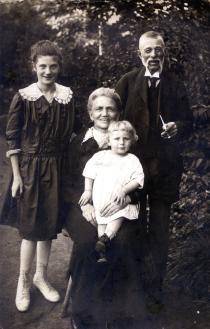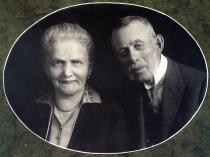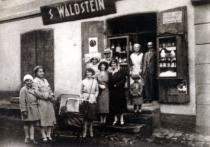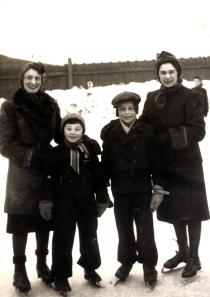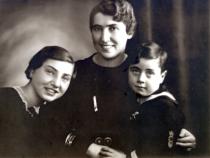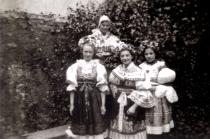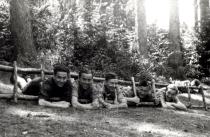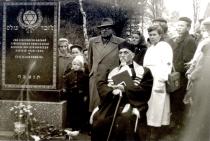On this family photograph, which was taken in 1925 in Trebic, you can see my grandfather Alexandr Fried with his wife, grandma Fried. My sister Erika Felixova, nee Friedova is sitting in my grandmother's lap. I don?t recognize the young lady on the left.
There's one charming family anecdote about my grandparents on my father's side: Grandpa brought Grandma to the local bar, where people were dancing the tango. As they were watching the dancers, Grandpa after a while asked Grandma how she liked it. And Grandma answered: 'Yes, it's nice, but that's something we used to do in bed.'
My sister was born on 8th January 1923. Erika and I don't have a lot of common experiences. We didn't play together, mainly because of the large age difference of seven years; when I was seven, my sister was already a young lady of 14. She was friends mainly with Jewish girls. This was due to the ethics of the time. Girls in those days had to socialize differently, because they were interested in finding a Jewish boy. Despite this Erika met a non-Jewish young man from Pilsen. In the times of the mobilization he was assigned as a soldier to the barracks in Trebic. In the end their relationship ended, because my parent's didn't like that he wasn't Jewish. If in those days she would have married him, maybe she would have survived the war. After 1945 that young man contacted us again and asked after my sister.
Erika graduated from high school in Trebic, and after that she went to language school in Prague. During her studies in Prague she stayed with my mother's sister Valeria. After a year she had to interrupt her studies because a law was passed forbidding Jews from studying. She got married shortly after returning to Trebic. The selection of Jewish partners in the town was quite clear. The wedding was decided on between the parents and a wedding ceremony followed. She married Arnost Felix, whose parents had a distillery and a house on the main square, which was some sort of sign of social standing. I remember almost nothing of the wedding. It was a so-called 'wartime wedding'. They got married before they sent us to Terezin, so that they could stay together. They were married by Rabbi Ingber under a chuppah, which was inside the synagogue. I don't know how many wedding guests they invited. For me as a young boy it wasn't something important.
My sister and her husband were deported together to Terezin in April 1942. In Terezin we met only sporadically: they were chance, short-term encounters. A year later they deported her and her husband Arnost to Auschwitz, where she perished in 1944, in the gas chambers.

